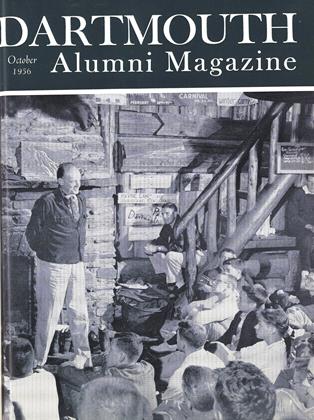DARTMOUTH'S Thayer School of Engineering, which since its founding in 1870 has given a unique emphasis to liberal arts education as a desirable base for professional engineering study, has strongly reaffirmed this policy with the announcement that in cooperation with the College it will offer a new engineering program. The new program is based upon an Engineering Science Major and is designed to take advantage of the distinctive opportunity at Dartmouth for blending liberal arts and engineering education, and also to integrate engineering education increasingly with basic science.
The program is the outcome of a twoyear study under the direction of the Trustees Planning Committee. Participating in this study were the faculty and alumni of Thayer School, members of the College science faculty, and outside consultants on engineering education. The latter included Dr. Gordon S. Brown, head of electrical engineering at M.1.T.; Dean S. C. Hollister of the Cornell Engineering School; and Dr. John A. Hutcheson, Vice President of Westinghouse Electric Company.
In the opinion of the consultants, "Dartmouth ... has a golden opportunity to do two things at once. The first is to train well-rounded men, and the second is to give them a training in the physical sciences that will qualify them for the kind of engineering competence that will have the greatest social value in the future with the maximum potential for creative leadership. Very few schools now do this."
The new Engineering Science Major, leading to the Bachelor of Arts degree in four years, will be the basis of all Dartmouth's future engineering offerings. A fifth year of study in civil, mechanical or electrical engineering will lead to the professional engineering degree of Bachelor of Science in the branch studied. Students who continue in the basic and engineering sciences for a fifth year will work toward a Master of Science degree.
The outstanding characteristic of the Engineering Science Major is that it develops a common core of mathematics, basic sciences and engineering science courses while enabling the student to take as much as forty per cent of his college work in the humanities and social sciences. The first three years will provide a common educational experience for all students interested in engineering. The fourth ear includes science and branch engineering electives enabling the student to prepare for his fifth year of work in civil, mechanical or electrical engineering, or in engineering sciences.
The branch engineering curricula will be directed toward professional engineering and, with increased emphasis on basic science content, will prepare the Thayer School graduate for careers in the new and developing technologies. Upon completing the fifth year the graduate will be qualified for direct employment as an engineer or for additional study for more advanced degrees at other institutions. Ain the past, it is expected that the majority will proceed directly into industry or engineering practice. In view of the national need for a greatly increased supply of engineers, it is contemplated that the Thayer School enrollment will be enlarged under the new program.
In commenting on Thayer School's continued adherence to liberal arts education as a base for professional studies, an approach now widely accepted among engineering educators, Dean William P. Kimball '28 added, "The program also meets the two most significant emerging trends in engineering education and practice. These are the orientation of undergraduate engineering education toward basic and engineering sciences and the emphasis on 'systems' engineering which requires close teamwork among scientists and engineers of different disciplines. This type of engineering activity emphasizes the importance of basic science in engineering analysis and is resulting in a steady weakening of the boundaries between the specialized branches of engineering."
 View Full Issue
View Full Issue
More From This Issue
-
 Feature
FeatureBusiness as a Social Service
October 1956 By THE HON. RALPH E. FLANDERS, LL.D. '51, U.S. SENATOR FROM VERMONT -
 Feature
FeatureIndustry Galls On the Liberal Arts
October 1956 -
 Feature
FeatureHE DUG DEEP TOO
October 1956 -
 Feature
Feature1960: Big, Bright, Lots of Them
October 1956 -
 Feature
Feature"Dartmouth Visited"
October 1956 By ROBERT L. ALLEN '45 -
 Class Notes
Class Notes1918
October 1956 By ERNEST H. EARLEY, W. CURTIS GLOVER, RICHARD P. WHITE








